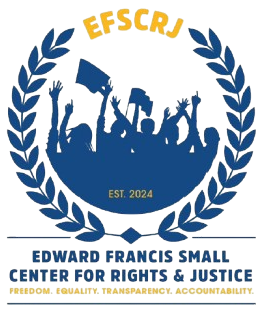Overview of the EFSCRJ Strategic Plan (2025–2029)
Introduction
The Edward Francis Small Centre for Rights and Justice presents a bold and comprehensive five-year strategic plan to advance human rights, democratic governance, and social justice in The Gambia. under the theme ‘Justice for All: Advancing Freedom, Equality, and the Rule of Law,’ the plan responds to the nation’s fragile democracy, which continues to grapple with the legacy of authoritarian rule, weak institutions, corruption, and systemic discrimination.
Vision & Mission
EFSCRJ envisions “an open, just, and equal society where all citizens enjoy unfettered freedom.” Its mission is to promote and protect human rights through advocacy, legal reforms, civic empowerment, and partnerships at local, national, and international levels. The Centre is guided by the core values of independence, transparency, justice, and inclusion, ensuring its work remains impartial and rooted in the principles of transparency and accountability.
Context & Challenges
The Gambia’s transition from dictatorship under Yahya Jammeh to democracy under President Adama Barrow has seen progress, including legal reforms (e.g., the Access to Information Act, Anti-Corruption Act) and the creation of critical institutions such as the NHRC, Information Commission and a ministry for women, children and marginalized populations within the wider framework of transitional justice. However, persistent challenges remain:
- Weak governance: Polarized institutions, executive overreach, and corruption.
- Civic restrictions: Journalists and activists face harassment; protests are often suppressed.
- Exclusion & discrimination: Women, youth, PWDs, and minorities remain underrepresented.
- Slow justice: Judicial backlogs and impunity for human rights violators.
- Socioeconomic struggles: Poverty, unemployment, and migration crises undermine rights.
Strategic Framework
The plan is structured around five interconnected pillars, each targeting critical governance gaps while integrating cross-cutting themes like gender equality, youth engagement, and climate justice.
- Freedom
- Goal: Protect civil liberties (expression, media, assembly).
- Actions: Legal reforms, journalist protection, and civic space monitoring.
- Outcome: Fewer crackdowns on dissent; stronger legal safeguards.
- Equality
- Goal: Combat discrimination and promote inclusion.
- Actions: Advocacy for anti-discrimination laws, quotas for marginalized groups.
- Outcome: Increased representation in leadership; reduced exclusionary practices.
- Empowerment
- Goal: Build an informed, active citizenry.
- Actions: Civic education, grassroots mobilization, and voter engagement.
- Outcome: Higher political participation; community-led accountability.
- Transparency
- Goal: Ensure open governance and anti-corruption measures.
- Actions: Whistleblower protections, budget tracking, and public access to information.
- Outcome: Reduced corruption; greater trust in institutions.
- Accountability
- Goal: Strengthen the rule of law and reduce impunity.
- Actions: Strategic litigation, judicial reforms, and human rights monitoring.
- Outcome: Prosecutions for abuses; faster justice delivery.
Theory of Change
EFSCRJ’s approach links short-term wins (e.g., training activists, legal advocacy) to long-term systemic change (e.g., institutional reforms, cultural shifts). By empowering citizens, reforming laws, and holding power to account, the Centre aims to create a virtuous cycle of democratic resilience.
Implementation & Adaptation
- Monitoring: Progress is tracked through quantitative metrics (laws passed, case resolutions) and qualitative insights (community testimonials).
- Flexibility: Adaptive strategies address political backlash or emerging issues (e.g., digital rights, climate justice).
- Partnerships: Collaboration with civil society, media, government, political parties, and international allies ensures sustained impact.
Call to Action
The plan is a collective endeavor. EFSCRJ calls on Gambians – activists, policymakers, politicians, intellectuals, business, leaders, journalists, and ordinary citizens – to join in building a nation where:
- Rights are non-negotiable.
- Institutions serve justly.
- No one is left behind.
Inspired by the legacy of Edward Francis Small, the Centre reaffirms its commitment to a Gambia where freedom, equality, and accountability are not just ideals, but lived realities for all.
No Taxation Without Representation. No Representation Without Adherence to the Rule of Law.” Inspired by EF Small’s Legacy
